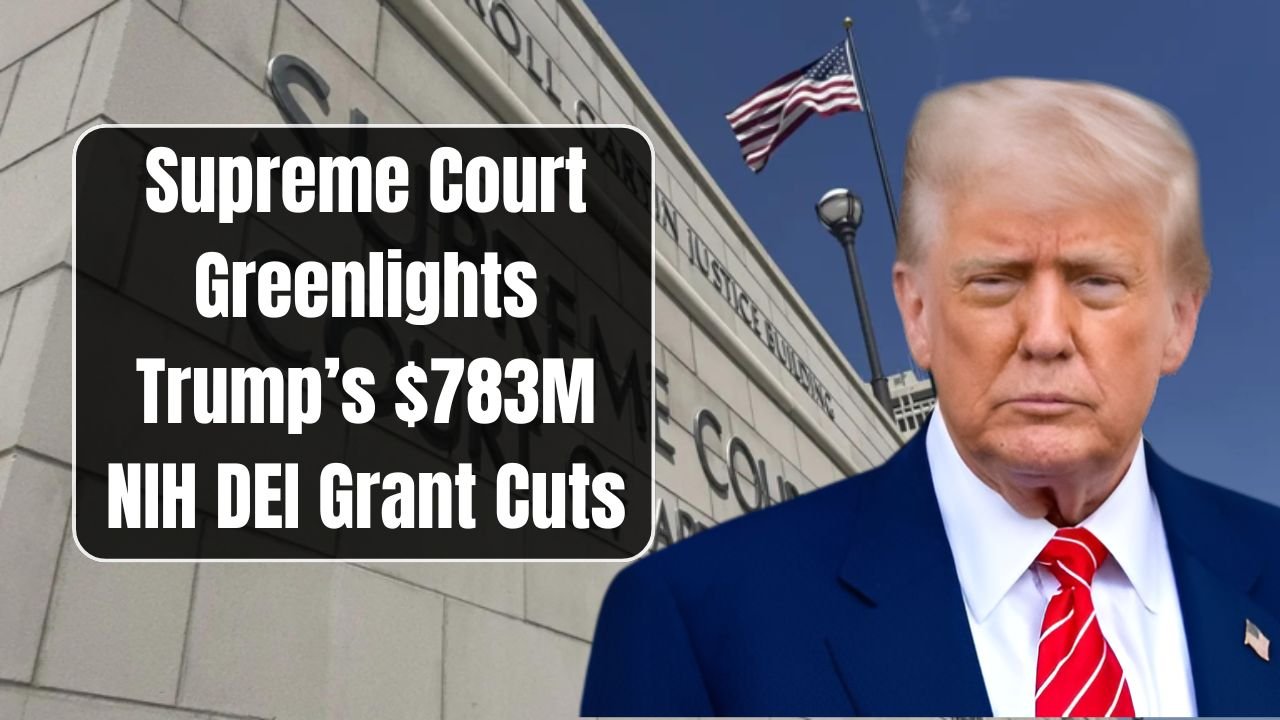An important decision taken recently in Washington has caused a big upheaval in the US health research sector. The US Supreme Court has allowed the Trump administration to cancel health research grants that were promoting Diversity, Equity and Inclusion i.e. DEI. This decision came on August 21 and under this, the administration has got the right to stop NIH (National Institute of Health) funding of $783 million. This decision is not only a shock to the scientific community but also raises deep concerns about the future of research in America.
What is DEI and why is it in controversy?
DEI i.e. Diversity, Equity and Inclusion is seen as efforts that give equal opportunities to different backgrounds, races, gender identities and social groups. The purpose of DEI in scientific research is to ensure that studies and research are not limited to a limited class but reflect the needs of all sections of society. But the Trump administration believes that DEI programs often become a means of ‘hidden racial discrimination’ and government money is used to pursue a ‘political agenda’.
Supreme Court’s decision and its impact
According to the Supreme Court in its recent rulings, the current administration is at liberty to cancel on-going NIH grants. Nevertheless, the Chief Justice of the court, John Roberts and three liberal judges of the court had voiced their opinion in support of the continued ban of these funds. The court has also stated that administrative policies not to approve future grants under DEI purposes, gender identity or even COVID-19 are not subject to imminent effect and needs to be heard in another court with a case of termination of previously approved grants.
Lower court’s opposition and allegations of ‘discrimination’
Earlier this decision, a federal court in Massachusetts had described the termination of NIH grants as “incredibly arbitrary” and “motivated by racial discrimination”. US District Judge William Young had said that “I have never seen a case where racial discrimination is so clearly visible.” He believed that this decision would not only harm scientific research but would also create obstacles for America’s LGBTQ community and minority researchers.
Administration’s argument: Court’s interference in policy decisions is not appropriate
Trump administration lawyers say that this case is related to government contracts and it should be heard not in a general court but in a special court for contract disputes. They said that decisions like stopping health research funding are part of policy-making and should not be questioned by the courts. The administration also argues that programs running in the name of ‘diversity’ often hide real discrimination and misuse taxpayers’ money.
Reaction of the scientific community and possible losses
This decision has caused widespread dissatisfaction in the scientific community. The American Public Health Association has warned that this decision will cause “unprecedented disruption” in ongoing research. These include research on the causes of diseases like Alzheimer’s, study of increasing cases of heart disease in rural areas and measures to deal with antibiotic resistance. The organization says that interruption of these research will cause “unlimited damage to public health”.
NIH’s Importance and Global Impact
The NIH is the largest source of biomedical research in the US and the largest public funder in the world. Grants provided by the NIH have contributed significantly to the fight against cancer, heart disease, infectious diseases and health disparities for decades. Cutting these funds will not only affect the health of American citizens but will also have a negative impact on global health research.
Conclusion: Growing threat of conflict between science and politics
The case indicates that the tension between politics and science is increasingly growing in the US. When evaluating the issues of research, the scientific community sees the need to conduct it without any social or political bias and elective benefit in the direction of the specialists and the rest of the society. The Trump administration, alternatively, views research through lenses of politics and ideology. One wonders whether the science will remain open to the political ideologies or scientific rationality will be elbowed out in policymaking. These legal and political vantage points in this matter in the months to come are going to decide the future path of health research in the US and the world.
FAQs
Q1. What did the Supreme Court decide about NIH DEI grants?
The Court allowed the Trump administration to cancel $783 million in existing NIH research grants linked to diversity, equity, and inclusion (DEI).
Q2. Why is the decision controversial?
Critics argue the move is discriminatory and could disrupt critical health research, while supporters claim DEI programs misuse taxpayer money.
Q3. What was the lower court’s stance?
A federal judge in Massachusetts had called the cuts “arbitrary” and “racially discriminatory,” but the Supreme Court overruled that decision.
Q4. How does this impact ongoing research?
Public health experts warn that halting these grants could harm research on Alzheimer’s, heart disease, and antibiotic resistance.
Q5. What is NIH’s role in U.S. research?
The NIH is the largest public funder of biomedical research in the world, crucial for advancing medical science and public health.


